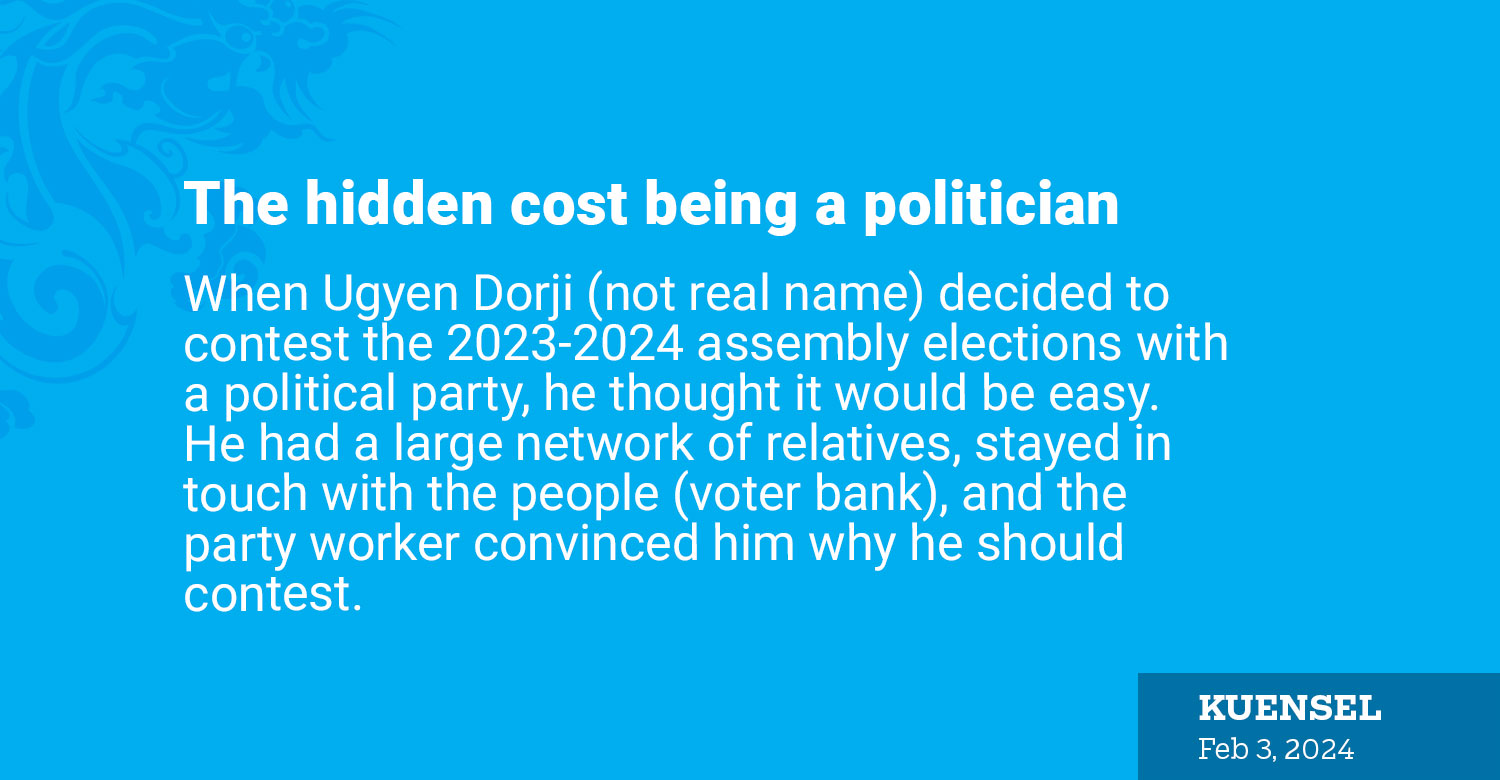Chencho Dema
When Ugyen Dorji (not real name) decided to contest the 2023-2024 assembly elections with a political party, he thought it would be easy. He had a large network of relatives, stayed in touch with the people (voter bank), and the party worker convinced him why he should contest.
The reality astounded him. He found himself, from the first day, obliged to perform various tasks for the voters ranging from providing financial assistance, school admissions, seeking judiciary expedite, employment opportunities, hospital appointments,and dealing with legal conflicts especially when their relatives, friends or family members came into conflict with the law.
With the election over and as a new elected government takes charge of ruling the country for another five years, politicians like Ugyen are left wondering what participating in the Bhutanese electoral process means to them. The obligation, according to the likes of Ugyen, starts with their declaration.
The list is long.
One candidate calculated that about one-third of his salary went in supporting religious activities that extended even beyond his constituency. “I still receive calls and messages from those seeking funding and donations for constructing lhakhangs, purchasing statues, and organizing rimdros, among other religious ceremonies,” he said.
Then there were unidentified callers who called requesting for mobile phone talk time and data recharge. The requests for assistance were received daily, and were left with no other but to respond and provide help.
“After announcing my interest in politics, voters, particularly in rural areas, began reaching out to me with their requests,” says a former MP who lost this time.
To begin with, the campaigns were resource extensive, requiring a lot of funds besides what was provided by the Election Commission of Bhutan for the purpose. A candidate who lost said it was an open secret that one required a substantial amount of money to run a campaign, especially in wooing voters.
“Some candidates from my party who resigned from their jobs spent all their retirement benefits during the campaign and, unfortunately, ended up losing the election,” he said.
A candidate from Punakha remarked that entering politics in Bhutan was an endeavor where one must be prepared to undertake multiple roles such as a driver, social media manager, communications, and many more.
By contrast, in other countries these tasks were typically assigned to others while your primary responsibility was to move around the constituencies, advocating for both your personal and party’s pledges, he said.
Some of the candidates Kuensel talked to said that individuals aspiring to enter politics need to be mentally and financially prepared to meet the expectations of the voters, regardless of whether they can fulfill those demands or not.
A former MP, who lost in the primary round from the East said, “Entering politics comes with numerous demands, and the fear of losing even a single vote compels us to meet the expectations of the voters, striving to keep them satisfied, even though we are uncertain if they will ultimately vote for us.”
A candidate whose son is a doctor was shocked when voters called him requesting his son attend to them, their relatives or friends. A close relative of the candidate said that elections are all about who can benefit the voters. “It is easy to win if you can promise freebies,” he said.
Some feel Bhutanese voters are pampered with populist decisions. “They like parties that promise quick returns without thinking about the larger interests. If I feel that taxes have to be revised, it is a weapon for the rival candidate. The voters will agree with him because nobody wants to part with their hard-earned money.”
Many said that with more political parties contesting, locals who are influential in the village, chiwog or geowogs could make the most of the election with money being the common denominator. The so-called party workers made the most of it, according to candidates looking for support.
“Party ideologies didn’t matter at all. Their interest was who could pay more to rope in the most influential villager,” said a media campaign manager with a political party. Although difficult to verify, party workers and candidates said that money mattered in who gets the most supporters.
“In the remote villages, an influential villager on the payroll of a political party can influence the election results. Sadly, it is not what they think of a political party, but what they can reap from them,” he said.


